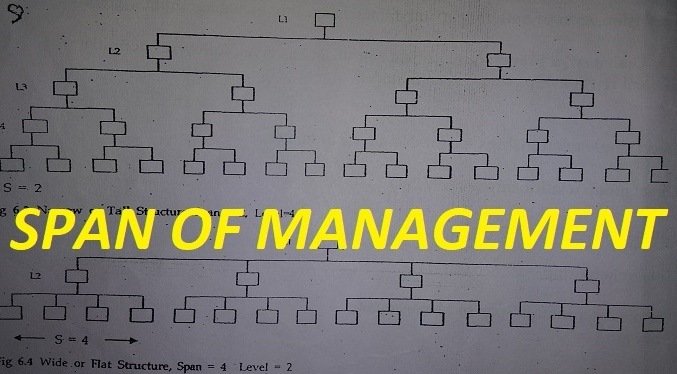
The span of safety management refers to the number of subordinates a manager or supervisor can supervise effectively because of his limitations of time, capacity, ability, nature of work, pressure of work etc. No single individual can effectively supervise unlimited number of subordinate. The terms span of management, span of control, span of supervision, span of authority are used interchangeably in management literature.
V.A Graicunas, a French management consultant has given following formulae for different relationships due to span as under:
Direct single relationships = n(n=No. Of sub ordinates)
Direct group relationships = n(2n/2-1)
Cross Relationships = n(n-1)
Total relationship = 2n/2n(+n-)
Factors determining Span of Management
They are-
- Nature of work.
- Type of technology.
- Ability of the manager.
- Capacity of subordinates.
- Degree of decentralization.
- Staff assistance.
- Communication techniques.
- Time available for supervisors.
- Geographical distance of subordinates.
Narrow (tall) & Wide (flat) span
Narrow span means a few subordinates and wide span means more subordinates directly under one manager or supervisor.

Now a day a tendency toward wide span of management is increasing because of
- The trend of decentralization.
- Increasing size of organization.
- Need for quick decision making.
- Faster communication techniques.
- Growing acceptance group process and new patterns of leadership.
Difference between tall and flat structure is as follows:-
| No. | Tall Structure | Flat Structure |
| 1. | Centralisation and close control. | Decentralisation and loose control. |
| 2. | Better co-ordination due to inter-locking network. | Difficulty in coordination. |
| 3. | Less mistakes due to close super-vision. | More mistakes due to loose supervision. |
| 4. | Good for staff desiring detailed guidance. | Good for staff requiring independence, challenge and responsibility. |
| 5. | Distorted and delayed communication. | Speedy and improved communication. |
| 6. | Costly because of overheads. | Less supervision and less overhead. |
| 7. | Greater distance between top and bottom. | Lesser administrative distance. |
| 8. | Less pressure on managers. | High pressure on managers. |
| 9. | Less opportunity for development of subordinates. | More such opportunity. |
| 10. | Less competent subordinates can be employed. | Competent kind willing subordinates are required. |
Delegation and Decentralization of Authority
(A) Delegation of Authority
Definitions:
- F. G. Moore – Delegation means assigning work to others and giving them authority to do it.
- Koontz & O’Donnell – Authority is delegated when decision making power is vested subordinate by superior.
- Koontz & Cyril O’Donnell – The entire process of delegation involves the etermination of results expected, assignment of tasks, delegation of authority for accomplishment of these tasks and exaction of responsibility for their accomplishment.
- Dr. Terry – Delegation means conferring authority from one executive or organization unit to another in order to accomplish particular assignments.
- Louis A. Allen – It is a process a manager follows in dividing the work assigned to him so that he performs that part which only he, because of his unique organizational placement, can per forth effectively and so that he can get others to help him with what remains. Allen says “once a man’s job grows beyond his personal capacity, his success lies in his ability to multiply himself through other people” (delegate his work to others).
- Jeff. Ilerris – Delegation of authority is the delivery by one individual to another of the right to act, to make decision, to requisition resources and to perform other tasks in order to fulfil job responsibilities.
- EFL Breach – Delegation means the passing on to others of a share in the four elements of the management process, that is to say, in the command of the activities of other people and in the responsibility for the decision making that will determine the planning, co-ordination and control Of the activities of such other people. Thus, delegation means assigning work to others and giving them authority to do it. It gives right to decision making in certain defined areas and charging subordinates with responsibilities for carrying out those assigned tasks.
Characteristics
- A superior grant some authority to a subordinate who must act within the limit prescribed.
- Entire authority cannot be delegated.
- Responsibility cannot be delegated. No manager can escape from his obligation by delegating authority to subordinates.
- Delegation does not reduce the authority of a manager. It is retained even after delegation. Manager can reduce, alter, enhance or take back the delegated authority.
- Delegation may be specific or general, written or oral, formal or informal. It does not mean avoiding decisions or abandonment of work.
- It is an art because it is creative, practice based, involves personal skills, result oriented and personalized process.
Importance of Delegation:
- Human capacity is limited. By delegation, a manager can distribute his workload to others and he can concentrate on more important policy matters.
- It facilitates quick decisions because the authority to decide lies near the point of action. Subordinate can decide easily and quickly.
- It enables to obtain specialized knowledge and expertise of subordinates.
- It improves job satisfaction, motivation and morale of subordinates. It satisfies their needs of recognition, responsibility and freedom. It prepares a second line of command which is always useful.
- It increases interaction, understanding and healthy relationship with subordinates. It binds group members together.
- It is an aid to executive development It facilitates expansion and diversification of business through a team of competent and experienced workers.
Process (Elements) of Delegation: It involves four steps (1) Results are defined before delegation (2) Assignment of duties (3) Granting of authority and (4) Creating accountability for performance.
Degree of delegation is classified as over-delegation or under-delegation.
Obstacles of delegations are reluctance to delegate (by managers), reluctance to accept delegation (by subordinates) or if both are ready there are organizational weaknesses like inadequate planning, splintered authority, lack of unity of command, absence o’ control techniques, non-availability of competent persons, unclear authority, internal distrust etc.
Principles of Delegation:
- Define functions (job, target, mulls) before delegation.
- Delegate authority and power necessary.
- Parity (balance) of authority and responsibility should be maintained.
- Responsibility cannot be delegated.
- Unity of command i.e. a subordinate should be responsible to one superior only.
- Limits of authority of each subordinate should be well defined.
- Authority level principle i.e. each subordinate should take decision within his jurisdiction only and matters beyond his scope of authority should be referred to superior.
- Scalar principle i.e. chain of authority should go without break from top to bottom in organization structure. Each employee should be aware of the source from which authority and command flow up to him and to whom he should report his work and difficulties.
Decentralization of Authority
Definitions
- Henry Fayol – Everything that goes to increase the importance of subordinates’ role is decentralization, everything which goes to reduce it, is centralization.
- Joseph Meassie – Decentralization is an organizational concept which takes decision making to the lower levels of organization.
- Newman, Summer and Warren – It is nothing but distribution of managerial functions and assignment of definite responsibilities to various managerial units.
- Keith Davis – Dispersal of authority and duties to the lowest unit in the organization so far as it is feasible is called decentralization.
- E.F.L. Breach – it is the pattern of responsibility arising from delegation.
- Earnest Dale – It is the delegation of business decisions by the owners to their immediate representatives and then to others further down In the management hierarchy.
- Louis A. Allen – It is the systematic effort to delegate to the lowest levels all authority except that which can be exercised at central points.
Decentralization is associated with fundamental principle of democratic management. Centralization and decentralization are relative and opposite terms. Neither 100% centralization nor decentralization is desired or possible. Proper balance between them is required depending on nature and Span of the management
| No. | Delegation | Decentralisation |
| 1. | It is a technique of management. | It is a philosophy of management. |
| 2. | Relationship between superior & subordinate. | Relationship between top management and other department or divisions. |
| 3. | It is essential and useful. | It is optional. Management may or may not disperse authority. |
| 4. | Person, who delegates, holds control over subordinates. | Control is delegated to departmental heads. |
| 5. | It is a process or an act. | It is the end result of delegation. |
| 6. | Delegation is possible without decentralisation. | Decentralisation is not possible without delegation. |
Degree of Decentralization:
Earnest Dale has given four tests to measure degree of decentralization.
- Number of decisions.
- Importance of decisions.
- Effects of decisions.
- Checking of decisions.
Effective Decentralization: This requires-
- Proper balance between centralization & decentralization.
- Centralized authority to decide proper decentralization, co-ordination and to resolve its problems.
- Good number of competent managers.
- Effective and speedy communication.
- Adequate controls to distribute resources, assign costs, lay down standards and norms.
- Willingness of the top management to shark authority downward.
Factors determining Decentralization: They are:-
- Size and complexity of the organization.
- History of the organization.
- Nature of functions.
- Scattered operations of production, sale etc.
- Planning and control procedures.
- Degree of diversification.
- Complexities of the situation.
- Availability of competent personnel.
- Communication system.
- Outlook of the top management.




